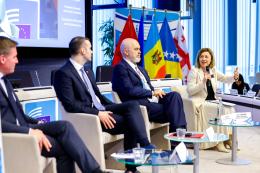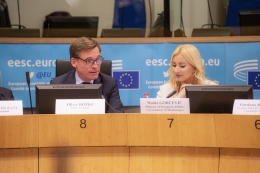European Economic
and Social Committee
Países de la ampliación
El CESE participa activamente en el proceso de ampliación de la UE y ha desarrollado un enfoque dual (regional y bilateral) para sus relaciones con las organizaciones de la sociedad civil en los países candidatos a la adhesión.
En lo que respecta al enfoque regional, el Comité de Seguimiento para los Balcanes Occidentales (un organismo interno permanente del CESE) es el principal instrumento para coordinar las actividades del CESE en la región. El Foro de la Sociedad Civil de los Balcanes Occidentales, que se celebra cada dos años, forma parte de la labor del Comité de Seguimiento.
El CESE también trabaja bilateralmente con los países de los Balcanes Occidentales y con Turquía. Sobre la base de acuerdos de asociación entre estos países y la UE, con el fin de involucrar a las organizaciones de la sociedad civil en los procesos de preadhesión y adhesión, el CESE ha creado tres organismos conjuntos con representantes de la sociedad civil (con Turquía, Montenegro y Serbia). Cada organismo se compone de un número equivalente de miembros del CESE y del país asociado en cuestión, y se reúne dos veces al año.
El CESE mantiene contactos periódicos y organiza actividades conjuntas con las organizaciones de la sociedad civil de los países candidatos a la adhesión con los que aún no se ha creado ningún organismo conjunto de representantes de la sociedad civil.
La labor de los organismos conjuntos viene acompañada por la elaboración de dictámenes del CESE sobre los procesos de preadhesión y adhesión de cada país, así como sobre otras cuestiones de interés regional.


